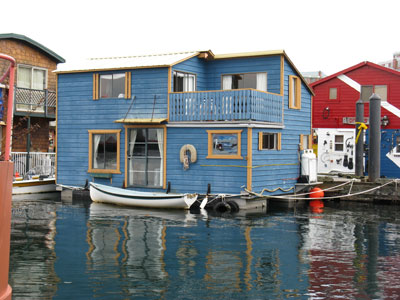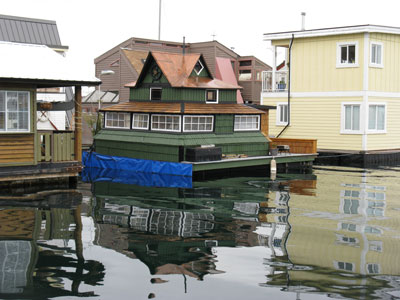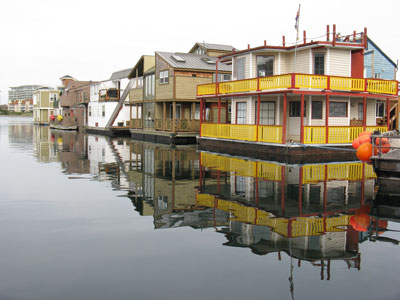Apr
27
Out to Sea
Apr 2010
By Doreen Marion Gee
What a joy to discover a colourful and eccentric colony at the ocean's edge! Fisherman's Wharf showcases a charming community of homes bobbing on a sparkling aqua trampoline. But the idyllic life of these float home owners is jeopardized by unregulated increases to their moorage rates by the Greater Victoria Harbour Authority. With no laws to protect them, some owners face an uncertain future. These are not vessels moored to a dock but beautifully constructed homes just like any land based dwelling. The residents feel that they deserve the same legal protection to keep their homes as any average renter. They are a solid community of people who trumpet the considerable economic and social benefits of their quirky seaside village. Right now they need a legal anchor to keep them from floating out to sea. 
As an eloquent spokesperson for the community, Jill Stainforth radiates confidence. But her eyes betray worry and fear. In 2008, moorage rates converted from linear to square footage. Rates skyrocketed for those owners with wider float homes who saw increases as high as 46%. The overall increase in moorage rates was about 25 per cent for most owners and has been about ten per cent a year since then. Stainforth maintains that their rates are much higher than other places in B.C. The conversion is standard, she says, but the increases should have been kept to the same level as anyone else in similar circumstances. The wharf residents want the same legal protection as manufactured home owners whose pad rental increases are regulated by the BC Residential Tenancy Act. In 2010, the maximum increase for a manufactured home park tenancy is 3.2 per cent plus a proportional amount.
"Fisherman's Wharf is for commercial marine use, it is not a residential area", counters Paul Servos, CEO of the Greater Victoria Harbour Authority. He 'empathizes' with the float home owners but says they have to abide by the rules of a marina, where moorage rates are based on the market value. Servos believes that float homes are not "the highest and best use of deep water areas". The GVHA's newest business plan states that "the number of float homes will be reduced over time..." Servos explains that he will "not negotiate the terms of the one year 'licenses of use' with his customers "including moorage rates". He sees the Fisherman's Wharf Community Association as a "special interest group with no legal standing" and states that he will not deal with them as a group.
At issue here is the total absence of any regulations or laws to protect float home owners. And there is no avenue for them to dispute these moorage rate increases. Stainforth worries that many of her friends will be forced to leave. She is quick to point out that they do not want subsidies and are not seeking long term tenure. All they want is their moorage rates regulated by law for the next year in their lives. The wharf community has hired a lawyer who will be representing them at a hearing at the Residential Tenancy Office on May 28, 2010. Their counsel's perspective (according to Stainforth) is that they "constitute a manufactured home park and are entitled to residency protection". Here is the formal statement from Seamus Gordon, representing housing issues in the Liberal Public affairs Bureau: "Jurisdiction over moorages depends on each individual circumstance. In this case the jurisdiction will be determined by the dispute resolution officer at the hearing."
Stainforth emphasizes that they want to collaborate with harbour staff : "Our deepest wish is to work cooperatively with the GVHA." The owners believe that the float homes put over a quarter million dollars into the GVHA's coffers every year just in moorage fees. Their marine village is a local treasure. Fascinated tourists bring in large revenues with all the eateries and craft shops. The residents open their homes once a year and collect money for the snack program at James Bay Community School. At Christmas, they light up their homes and collect food for the Mustard Seed Food Bank.
The float home owners' goal is a cooperative settlement with Paul Servos and the GVHA. They want a "win-win" future. With moorage increases kept to a predictable ceiling, they hope to keep their unique community intact so that all people can relish its beauty.
